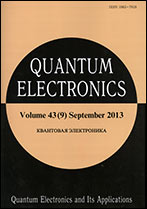|
Theory of wavefront reversal of radiation having a spatially inhomogeneous average intensity distribution
I. M. Bel'dyugin, I. G. Zubarev
Abstract:
A spectral method is used in an attempt to find a unified approach to describe several variants of wavefront reversal in stimulated scattering: in a waveguide and when spatially inhomogeneous and single-mode radiation is focused by a lens. It is found that this involves allowing for a specific correlation between the spatial spectral components in the expansion of the pump field. Approximate solutions are found for the scattered field in these cases.
Received: 28.05.1981
Citation:
I. M. Bel'dyugin, I. G. Zubarev, “Theory of wavefront reversal of radiation having a spatially inhomogeneous average intensity distribution”, Kvantovaya Elektronika, 9:3 (1982), 548–553 [Sov J Quantum Electron, 12:3 (1982), 326–329]
Linking options:
https://www.mathnet.ru/eng/qe12178 https://www.mathnet.ru/eng/qe/v9/i3/p548
|


|





 Contact us:
Contact us: Terms of Use
Terms of Use
 Registration to the website
Registration to the website Logotypes
Logotypes








